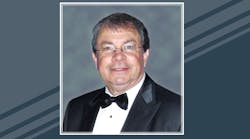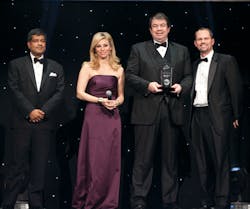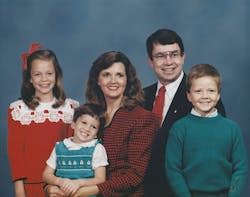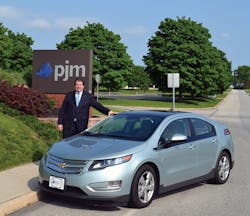Terry Boston has worked shoulder-to-shoulder with energy leaders around the world, traveling to France, South Africa, China, South Korea and other countries. He has explained complex energy issues to White House staff and U.S. Congress members. He has established business relationships with several U.S. governors and public utility commissioners. He has testified before the Federal Energy Regulatory Commission and served on boards for groups such as the IEEE, CIGRÉ, the Association of Edison Illuminating Companies, the North American Electric Reliability Council and the Very Large Power Grid Operators of the World, better known as GO15. And now he leads one of the premier regional transmission organizations (RTOs) in the United States, the PJM Interconnection, Valley Forge, Pennsylvania, U.S.
He earned his status in the industry through planning, hard work and relationship building. These qualities served him well and garnered him the respect of those he worked with as he rose through the ranks at Tennessee Valley Authority (TVA), Knoxville, Tennessee, U.S., which he joined in 1972 as a project engineer after earning an engineering degree at Tennessee Technological University.
Boston took the TVA job after being shown the control room under construction there. “It was wow!” Boston said with a still noticeable Tennessee accent. “Two stories underground, designed for anything other than a direct nuclear attack and with state-of-the-art computing power. I thought, ‘This is cutting edge.’”
During his 35 years at TVA, he rose to executive vice president of power system operations, then left in 2008 to become president and CEO of PJM Interconnection. PJM controls 65,556 miles (105,502 km) of transmission lines serving 61 million people in 13 states and the District of Columbia, manages 186,000 MW of generation (including 33 nuclear generating units) and coordinates the movement of US$100 million per day in wholesale electricity transactions, all of which makes it one of the largest RTOs in the world and puts it in the elite GO15 group of grid operators, of which Boston was president in 2013.
PJM has grown even more since Boston became president and CEO in 2008. He has expanded PJM’s total market from $26.7 billion to $35.9 billion, has increased PJM’s member companies from 500 to 879 and has received approval for more than $15 billion of new transmission.
However, Boston’s story is really a story of teams working together to make a difference, and Terry’s accomplishments and awards are but an outward view of an inner fire and true compassion. Wherever Boston has worked, he expected and awarded excellence.
“If you ever worked around Terry, and he saw you were competent in something, he never forgot that,” said Ron Rogers, who worked with Boston in TVA’s regional operation and transmission O&M group. Even if 20 years had passed, Boston would remember how someone impressed him and would help them advance if he thought they could help TVA.
“That was something special about him,” Rogers said. “A lot of people advanced based on Terry’s recollection of how they had done in other areas.”
David Hall, a childhood friend of Boston’s who roomed with him at Tennessee Tech and also became an engineer at TVA, worked for Boston’s group at one point in his career, but he never felt he got the job because of his friendship with Terry.
“Terry would always help a friend, but he would want his group to be successful,” Hall said. “So when Terry made decisions like that, he made them so his group could be successful, not just to help friends.”
Boston enjoys helping to develop the people around him, taking great pride in that both TVA and PJM offer assistance to employees getting advanced degrees.
“As I looked to build a solid team and to advance the organization, I was always looking for the brightest and best, and hiring them and giving them a chance to develop and produce new ideas,” Boston said.
Man with a Future
Boston’s values were instilled in him while growing up on a farm near Nashville, Tennessee, with a father who died when Boston was 10 years old, a mother who worked full time to make ends meet and grandparents who needed their 14-year-old grandson to drive them to doctors’ appointments. Boston worked on the family farm bringing in the crops. At 14, he got his first government contract with the city, mowing along streets with the family farm tractor. He worked construction jobs as a carpenter and a later as a field engineer during the summer while attending high school and college.
He likely surpassed the expectations of his fourth-grade teacher, Beulah McDonald, who after Boston beat her in checkers during one rainy day recess indoors, suggested that he become an engineer. However, Boston tells his wife, Brenda, that he is just a country boy trying to make it in the city.
“Helping other countries with electric grids — it’s just something we never thought we’d be doing,” Brenda said, still sounding surprised at the accomplishments of this hard-working young man she met in an organic chemistry class at Tennessee Tech.
“I know people know him and respect him because he’s worked hard to do all these things and he’s so committed to his work,” Brenda said. “But I just see him as that guy in the chemistry class. Isn’t that funny?”
Early in his career, Boston was noticed and selected for TVA’s management trainee program. He completed this while also pursuing a master’s degree in engineering administration from the University of Tennessee.
Acknowledgements began to roll in. In 1977, he was selected as the Tennessee Valley Outstanding Young Engineer, followed in 1984 by the TVA Engineer of the Year and Chattanooga’s Young Engineer of the Year. Just five years later, Boston received the Most Innovative User of New Technology Award from TVA’s research and development division.
The awards kept coming, including accolades from EPRI (Environmental Innovator Award in 1991 and Technology Innovator Award in 1997), IEEE Power & Energy Society (Leadership in Power Award in 2011), and the Electricity Storage Association (International Leadership Award in 2012).
Boston’s knowledge of the TVA system was on display internationally when he joined Hall and several other TVA employees for a business trip to China. The TVA group was on a barge on the Han River, a tributary of the Yangtze River, offering a presentation to the Chinese about how TVA developed its river system. After other TVA employees offered their thoughts
related to their departments, Boston unrolled a map of the Tennessee Valley and talked through why and where TVA built its dams and the purposes for each.
“It was amazing to watch him speak so knowledgeably about how and why the Tennessee River was developed,” Hall said.
PJM has won two Platt’s Global Energy Awards since Boston became CEO. In 2010, it won the Global Energy Industry Leadership Award, and in 2012, it won the Global Energy Industry Excellence Award. Boston accepted the award for PJM and is pictured here (from left to right) with Andy Bose, Platt’s vice president and general manager of oil; Amanda Drury, a CNBC co-anchor; and James Simpson, Platt’s vice president and general manager of power. Photo courtesy of PJM.
Man of Leadership
In addition to having a wide knowledge base, Boston’s co-workers also know him as a forward-thinking leader.
“Terry was always innovating, always had tremendous initiative and drive,” said Van Wardlaw, who worked with Boston in transmission and customer service at TVA from 1983 to 2008. “It was somewhat legendary.”
Dale Bradshaw, who worked in the transmission research and development group when Boston was executive vice president of power system operations at TVA, received many green lights from Boston for his research ideas. One project involving dynamic thermal rating of the transmission lines cost TVA $150,000, but it helped the company get an extra 20% to 30% out of a transmission line, preventing the need for two new substations and a new transmission line, all of which would have cost $28 million, Bradshaw said.
“Quite frankly, at that time, we had the No. 1 transmission research program in all of North America because of Terry,” Bradshaw said.
Boston’s leadership and ability to think ahead were rarely more evident than during extreme weather events when he would gather with his team in the emergency center.
“Where we might be thinking about getting some lines back and substations re-energized, Terry was already out to the next level with how are we going to get the crews fed and sheltered after today and after tomorrow?” said Rogers. “He was really good with that.”
Boston, who headed TVA’s storm center for 20 years, had forged good relationships with other utilities, the local military, state and local governments, and others that helped TVA with restoration efforts. During an ice storm in Mississippi, Boston secured a Tennessee National Guard transport plane and worked with the Mississippi governor to transport chainsaws, portable generators, operators and other supplies to the state. The governor made barracks available for the crews to sleep in. Boston even gave his credit card to one of the TVA staff to buy as many chain saws and generators as he could before the plane left, which maxed out Boston’s $350,000 credit card limit.
“It was amazing,” Rogers said. “We only did our parts of it. Terry coordinated the whole thing.”
His ability to think ahead was forged as an engineer trainee when, after taking in the daily optimization schedule for the plants and the interchange, he spoke with control room dispatchers to find out what they had learned during their years working extreme events and storms.
“I found what was happening in the control room quite exciting,” Boston said. “I still have tremendous respect for the people who maintain and operate the system.”
Boston’s respect for others extends to his leadership style. He never had to raise his voice or shake his finger in a meeting if something displeased him.
“We knew by the words that he chose and the look that he gave that we needed to do some work to bring things up to his expectations,” Rogers said. “Terry was always a gentleman.”
And Boston encourages people to speak up if they disagree. “He would say things like, ‘Don’t ever let me march us off a cliff when you see it coming. You make sure we stop and know what’s ahead of us,’” Hall said.
Leadership qualities are most evident during hard times. Perhaps one of the most trying times at TVA was during the days of “Carvin’ Marvin,” as Marvin Runyon was called by some. Runyon became chairman of TVA after heading Nissan Motor Co. to implement cost and process improvements that resulted in downsizing of the TVA workforce.
Boston led the regional operations group at that time.
“The key during downsizing is that people were looking to leadership for leadership,” Wardlaw said. “Terry had the ability to always cast a vision, always hold out hope that in spite of the difficulties we’re dealing with, we will persevere. I think he helped the organization he was leading at that time work through that and come out for the better and not really sacrifice reliability and the things that were important to our customers while trying to get cost control in place.”
The national spotlight shone on Boston after another difficult time in the utility industry — the 2003 Northeast blackout. Although TVA was not involved in the blackout, Boston served on the NERC steering team that directed the investigation of the blackout.
“Terry stepped into a national leadership role in the aftermath of that,” Wardlaw said.
Man of Renown
Prior to the national spotlight, Boston had a reputation in regulatory and legislative circles as a straight shooter without a political agenda, according to David Withrow, who at the time worked in TVA’s Washington, D.C., office. When Boston first became head of transmission for TVA, he traveled to D.C. to explain power issues and a potential restructuring of TVA (which never happened) to U.S. Congress members from the TVA region. A TVA staff member who returned to TVA’s Washington, D.C., office after the meeting exclaimed, “Terry Boston is great. Everyone on the Hill loves him. He’s really knowledgeable. We have to get him up here more often,” Withrow recalled.
That was the beginning of many trips to Washington for Boston, who has the ability to connect with people and explain complex engineering and transmission issues in an understandable and enthusiastic way, said Withrow, who now works with Boston as director of governance at PJM.
Boston’s knowledge and verbal skills have made him a popular speaker at industry conferences. Withrow recalled that during a panel on which Boston served, one of the participants said, “I agree with what Terry says.” Another panelist then said, “I also agree with what Terry said.” The third panelist, not to be outdone, said, “I also agree with what Terry Boston said, and I agree with what Terry Boston has ever thought.”
Withrow said: “He can talk knowledgeably in a way that leaves people with something to remember. And he can — without being rude — dominate a conference panel with knowledge and interesting facts. People might not like PJM policies, but they like him. And that’s almost universal. People may not like organized markets, or they may not like the different fuel mix, but they like him personally.”
Man with a Legacy
Boston has left legacies at the organizations he has touched. He has improved the culture at PJM and strengthened the reputation of the company internally and externally, Withrow said.
One of the first projects Boston took up after joining PJM was to implement Perfect Dispatch, a tool that helps optimize the dispatch of generating resources which, to date, has led to more than $800 million in fuel cost savings. Boston led the construction of an advanced control center on PJM’s main campus as well as one 30 miles (48 km) away. He also improved security around the control centers and the Valley Forge campus. He led the refurbishment of at least five buildings on campus, improving the working environment by adding a cafeteria and an employee gym to help attract the best and brightest new employees.
His legacy at TVA is just as great, elevating the importance of transmission within TVA, Rogers said.
“We were there at a unique time in history when transmission was being deregulated,” Rogers said about Boston’s time at TVA. “Whereas the generating plants had gotten so much attention and money over the years, Terry was able to communicate to the highest levels in TVA — to the chairman and to the board — the importance of maintaining a customer relationship through transmission system reliability. He was able to convince them that the transmission system was so important in tying the generation to the load that you could run without a generator or two or three or four as long as you had a strong transmission system, so we needed top decile (99.999%) reliability there.”
Boston has always focused on performance. He got his competitive spirit and ideas about the power of teamwork in high school. He played football and basketball, and he and Hall were on their high school math team that won a regional competition against much larger high schools.
For a person with Boston’s drive, retirement might prove difficult.
“I can’t imagine him ever really retiring,” Brenda said. “He has loved his time at PJM. And I have, too. It has been a great opportunity for him. One of the smartest things he’s ever done is to be there.”
And recently, Boston was elected the president of the Association of Edison Illuminating Companies, a group founded by Thomas Edison, who was its first president 130 years ago. With that and his work at PJM, Brenda hinted that Boston has more to come.
“His greatest achievement might be in front of him, so the story’s not over yet,” she said.
Sidebar: Family Man
For Terry Boston and his wife, Brenda, their love might have seemed inevitable considering they met in an organic chemistry class at Tennessee Technological University in Cookeville, Tennessee, U.S., but the path to marriage took a little longer than most chemistry experiments, even though its success has proved out.
In the early 1970s, Boston and some friends walked in late to an organic chemistry lecture class, talking loudly and sitting behind Brenda. The two became friends and ended up in an organic chemistry lab class in which Boston let Brenda wear his navy blue nylon Sigma Chi jacket while they did their experiments in the chilly room.
The two only went out once in college, but after they graduated and started their careers — Brenda as a ninth-grade physical science teacher in Nashville and Terry as an engineer in Chattanooga — Terry called Brenda, and they started dating, often spending time over dinner discussing Brenda’s science class lesson plans. Terry would sketch helpful ideas on the dinner napkins.
“This was one of the things I liked about him, he loved science and math and his work,” Brenda said. “I could tell because that’s what he would talk about even back then.”
She also liked his sense of humor. Terry put it this way: “We found that we had good chemistry and got together.”
Brenda and Terry became friends at college but did not date seriously until after both graduated. They’ve been married for 38 years.
After they married, Brenda discovered the jacket she had borrowed during the chemistry lab class years before. It had holes in it, something Terry later confessed Brenda had done with acid when wearing it while doing her experiments.
“It shows what a good guy he is,” Brenda said. “He never mentioned that to me ever. He was very patient. He wasn’t going to tell me I’d ruined it.”
Seven years after marrying, the two had their first child, Rachel. At that time, Brenda left teaching to raise her daughter and the two sons who followed, Andrew and Brian.
Success runs in the Boston family. Rachel, Brian and Andrew (pictured left to right in 1990 with Brenda and Terry), have become successful in their chosen careers.
Those years were busy ones as Terry’s job and travel schedule became more demanding, the couple built a new house and the children became more involved in activities. However, their marriage survived because both of them found satisfaction in their passions, their outside activities and social circles while maintaining a commitment to their marriage, Brenda said. They also shared the same faith and the feeling that they each were following their calling.
The couple’s “good chemistry” helped them raise successful children. Rachel is an actress filming a TV series, “Witches of East End,” in Vancouver while Andrew is getting his MBA from Harvard and Brian is getting his Ph.D. in geophysics from the University of Hawaii.
The Bostons' daughter, Rachel Boston, is a witch, that is, she is playing a witch while starring in the new hit TV series “Witches of East End,” which is currently showing in six countries.
Thirty-eight years after marrying, the two are on their own again. Brenda often travels with Terry now, putting her love for and background in science to use as she sometimes takes notes for him at seminars he cannot attend — which means the couple is back to discussing science over dinner and scribbling notes on paper napkins.
Sidebar: Man with a Vision, a Volt and a Passive Solar Home
Terry Boston is a visionary, according to David Hall, one of Boston’s childhood friends and a former TVA co-worker.
“He is always looking to the future, not just in a dreamy way but in a way like he’s getting you prepared before the change happens,” Hall said. “Terry always said, ‘If you look ahead, you can help make change happen; it doesn’t just happen to you.’ That’s why he was always so plugged into the regulatory groups and industry groups. He wanted to help shape the future and not always be reacting to it.”
One of Boston’s visions is to make the United States more energy efficient. His belief in that comes across in the energy-efficient home that he and his wife designed over several years and built in 1988.
Boston installed a conduit out to the street for a fiber-optic cable, laid out the house as passive solar and made sure the roof was oriented south for solar photovoltaic.
“The fiber-optic cable after 20 years is there, but I’m still waiting for the Dow solar shingles to drop in price before I go with a power house,” Boston said.
The couple insulated the interior walls and put 8,000 pounds of granite in the sunroom for solar thermal storage during the day to keep the house warmer at night. The interior walls and the floors between the first and second floors were super insulated so the couple could heat it all when the kids are home or downsize the heating to about 1,500 sq ft if they are not home.
In December 2010, Boston bought one of the first Chevrolet Volt electric cars sold and gets the equivalent 178 mpg. The only maintenance expense in three years has been one oil change, and the car once emailed him that it had a slow leak in the right rear tire.
During the first few months that Boston owned the Volt, he took many visitors, PJM employees and even children of PJM employees for test drives beyond just the parking lot, said David Withrow, director of governance at the PJM.
Withrow said with a laugh, “He would tell them all about it. He would talk about the potential for electrification of transportation and what it would mean as a storage facility for the grid.”







